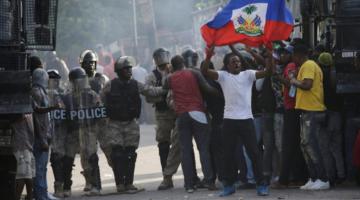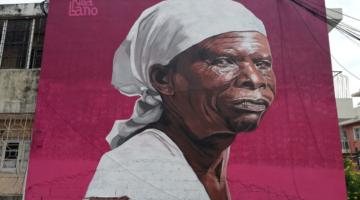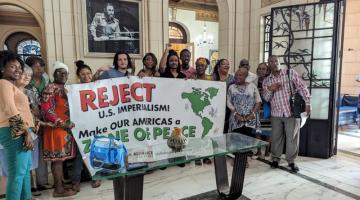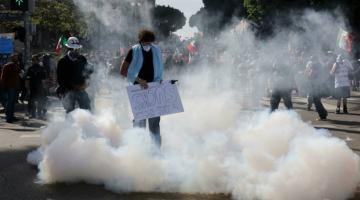A 1930 essay by Black activist Hermina Dumont Huiswood tells of the bold resistance of the Haitian population to U.S. occupation, and offers hope for the resistance to come in 2024.
In 1930, Black radical writer and activist Hermina Dumont Huiswood (1905–1998) published a short essay in Harlem’s Liberator magazine describing the conditions in Haiti under US military rule. Huiswood had arrived in Port-au-Prince during the fifteenth year of the US occupation. What she found appalled her. The supposed benefits and “improvements'' of US rule were nowhere to be found. Instead, the occupied republic was overrun by poverty, unemployment, and misery as Haitian people were displaced from the lands and forced to find low-paying jobs with US businesses. Over a decade and a half of Marine rule, the US had recreated their racial fantasies of Jim Crow in the Caribbean; white officers and officials lived in pristine, segregated compounds walled off from the Black masses, and walked around Port-au-Prince like “strutting tin gods,” as Huiswood put it,” forcing Haitians off the sidewalks and into the streets, and often brandishing their weapons in an obscene and insolent demonstration of white power.
Huiswood’s essay was titled “United States Oppresses Haitian Masses.” Yet in many ways, the title was a misnomer. For, as much as the story she told was one of US oppression of Haitians, it was also of Haitian resistance to the US occupation. In October, 1929, student protests soon became a country-wide general strike. By the time Huiswood arrived in Haiti, she noted that “the entire populace, workers, bourgeoisie, intellectuals, men, women and children,” were protesting the US occupation and its Haitian minions. The investigative commission of Herbert Hoover was met with almost total derision, the Marines were seen with contempt, and Louis Borno, the lame-duck Haitian stooge appointed as president of the occupied republic (think of a latter-day Ariel Henry) had lost all legitimacy. No one even bothered to attend his Mardi Gras events. The Haitian protests against the occupation were eventually successful, and by 1934, the US marines had withdrawn from Haiti.
Huiswood’s Liberator essay on Haiti is reproduced below. We reprint it to remember that the story of the US occupation is not only one of Haitian oppression, but of Haitian resistance – and as a reminder that that resistance successfully defeated US imperialism. The Haitian people won in 1934. They will win again in 2024.
United States Oppresses Haitian Masses
Hermina Dumont
Port-au-Prince, Haiti. March 10 (By Airmail). — The first contact with conditions here comes by way of the long quay swarming with men of all ages, ragged, tired, half-starved, many decrepit and ancient. All jostling each other for the job of unloading with its miserable starvation wages as they wait impatiently for the boat to dock. Staling about in the ridiculous pose of tin gods are the American marines, most of them recruited from the south. They provokingly wear their guns and bayonets. In the harbor is the S.S. Rochester which brought the commission, with which Hoover seeks to allay the burning unrest against the American imperialism.
First appearances to not show any of the “improvements” so much talked about by the apologists for imperialist oppression. Only the marines are everywhere. And the natives would hardly accept them as an “improvement. They act as if they own the place. They and their families do as they please, they ride around in cars and hog the right of way, refusing to permit other cars to pass. Those on foot take up as much of the road as they possibly can, jostling the people and trying to establish in Haiti the rule of the South and South Africa of forcing Negroes to keep off the sidewalks. The populace hate them like poison.
A huge mass demonstration of over 30,000 demanding immediate withdrawal of American forces greet the Hoover Commission upon its arrival. Placards and banners denouncing the American Occupation and demanding immediate withdrawal of the marines and the election of a new legislative council, the ousting of the traitor Borno, were in evidence all along the roads. Huge signs were put up along the streets reading “Withdrawal of the American Occupation,” “Give us back our freedom.” These signs are still up.
The entire populace, workers, bourgeoisie, intellectuals, men, women and children, turned out decorated with the Haitian colors, blue and red. Many wore a piece of crepe attached to the colors. On cars, on mules, on baskets, on buildings the colors are to be seen.
So intense is the anger of the Haitian masses against Borno that the traitor is forced to keep his residence under heavy guard. The guard is furnished by their marines and the gendarmes, a native force commanded by marine officers. Back of Borno’s residence is the marine headquarters. The Americans are lodges in imposing buildings, with spacious grounds and a theatre, while the native gendarme are housed in a little barracks across the street, and crowded in like cattle.
Two demonstrations have been held here since the Commission arrived, and because of the vast numbers involved neither was broken up. The first demonstration occurred February 28. A second demonstration was held on Sunday, March 2, in front of the hotel where the Commission is basking itself. This demonstration was composed wholly of Haitian women. Following the demonstration the women went to the chapel to pay for deliverance, thus showing themselves still under the illusion fostered by the imperialists and their priestly instruments.
There was a riot here on Thursday, February 27, on account of a rumor that Borno was planning to hold a secret election of Leon Dejean, another tool of the American Occupation. Over 3,000 people gathered in front of the State headquarters in angry protest. They were charged upon by police and marines and beaten up with revolvers and clubs. Forty workers were hurt, but the people gave a good account of themselves with several police stabbed. The chief of police is a strutting tin god from Mississippi, by the name of Evans.
Unemployment Severe
According to Haitian statistics of the three million population over two million are unemployed. Misery is very apparent and beggars are like flies upon the streets.
Demonstrating the keen interest of the Haitian masses in all protest movements, a protest mass meeting called by the Young Women Nationalist Organization brought out over 15,000 people, with house tops and trees crowded with spectators. Among the speakers were Georges Sejeurne, Louis Raymond, secretary of the Young Patriots League; Justin Sam, President of the Students League which led the strike a few months ago; Edward Cassaynol, Uzulnise Pierre Paul, daughter the president of the National Worker’s Party; Maxi Hudicourt, Antoine Vieux. A very militant spirit was shown by the entire crowd, demand for Haitian freedom being vigorously applauded. Women were very numerous in the gathering. Among some of the statements were: “The marines must go! Even if it is necessary that some of us die, and our home are burned to earth, the marines must go!” “We are not armed and the Americans have machine guns, but we are willing to match our machetes abasing their marine guns rather than to exist as slaves!” “We Haitians are willing to return to the jungle and the mountains in order to oust the marines!”
This week was Mardi Gras, but the people refused to celebrate and were preparing to have a battle if any one attempted to indulge in the Carnival spirit while Haitian freedom is at stake. On Saturday night the Borno government gave a public ball, but it was thoroughly boycotted and no one attended.
Hermina Dumont, “United States Oppresses Haitian Masses,” The Liberator, 15 March 1930



















